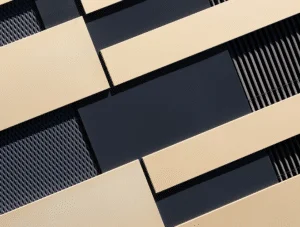When planning a project whether it’s architectural, industrial, or decorative the material you choose can make all the difference. Two popular options in structural and design work are expanded metal and wire mesh. Each has its strengths and compromises, and picking the right one will depend on your priorities in strength, cost, aesthetics, and maintenance.
In this article, we’ll compare expanded metal and wire mesh, walk through where each shines (and where each struggles), and help you decide which is best for your project.
Table of Contents
What are Expanded Metal & Wire Mesh?
Expanded Metal is produced by making slits in a sheet of metal and then stretching it to create a mesh of diamond-shaped openings. No material is lost in this process, which often makes expanded metal structurally more rigid than materials assembled from separate wires.
Wire Mesh consists of individual wires either woven or welded together into grid- or wire-patterned sheets. It offers flexibility in terms of wire thickness, aperture (opening) size, and pattern.
Key Features Compared
| Feature | Expanded Metal | Wire Mesh |
| Strength & Rigidity | Very strong; high load-bearing, resistant to bending because the sheet is continuous. | Strength depends on wire diameter and joint type; may bend or deform under strong load. |
| Weight | Heavier per unit area (since it’s made from sheet metal). | Lighter, especially with thinner wires and wider apertures. |
| Ventilation & Light Passage | Good ventilation; sets airflow and light diffusion depending on pattern and degree of stretch. | Can offer more open views and lighter feel; best for visibility or filtration. |
| Fabrication & Installation | Needs cutting and possibly special tools; edges can be sharp; more rigid. | Easier to cut, shape, and install; more forgiving to site adjustments. |
| Cost | Generally higher upfront cost and higher shipping/handling (due to weight). | Usually more economical, especially for large surface areas. |
| Maintenance & Durability | Highly durable, less likely to deform; finishes last longer under stress. | Can require more maintenance if wires loosen, corrode, or joints weaken. |
Applications: Where Each Material Excels
- Architectural Facades & Sunscreens – For facades where you want strength, bold texture, shade, and visual interest, expanded metal is a strong candidate. See how we approached exterior façade installations to balance design with durability.
- Security & Safety Barriers – Expanded metal works well for high-security barriers or cage guards. But for lighter fences, cages, partitions, or screening, wire mesh can give good security with more transparency. (Compare our designs in security barriers and wire mesh fencing.)
- Industrial Walkways, Platforms & Flooring – Expanded metal is often used for flooring or walkways because of its strength and ability to prevent slipping. For lighter access panels or drain covers, wire mesh may suffice.
- Decorative and Interior Design – Wire mesh offers a softer, more open feel for interior partitions, decorative screens, or ceiling elements. Meanwhile, expanded metal gives a strong visual texture that works well in more dramatic or modern-industrial settings.
Which Should You Pick? Decision Criteria
To decide between expanded metal and wire mesh, consider these:
- Load & Structural Requirements: If your project must bear heavy loads or resist impact, expanded metal is probably the safer, longer-lasting choice.
- Transparency vs Security: Want more view and light? Wire mesh tends to win. Want privacy, security, or shade? Expanded metal is better.
- Aesthetic Fit: Do you prefer a clean, open grid look, or a bold pattern with dramatic lines? Match material to your desired visual.
- Budget: Include not just material cost but costs of shipping, installation, finishing, and maintenance.
Environmental & Corrosion Considerations: If harsh weather or corrosive environments are involved, consider metals with protective finishes or coatings. Expanded metal may hold up better under stress; wire mesh might need more frequent inspection.
Tips for Working with Expanded Metal and Wire Mesh
- Finishes & Coatings: To prevent rust or tarnishing, use galvanized, powder-coated, stainless steel, or weather-resistant finishes.
- Edge Treatment: Expanded metal edges are sharp; consider safe edge folding or trims.
- Integration with Other Materials: Both can be used with wood, glass, concrete, or framing ensure anchoring is well-designed.
- Maintenance Plan: Regular cleaning, checking for rust or deformation, especially in wire mesh joints.
FAQs
Is expanded metal more expensive than wire mesh in the long run?
Often yes in the short term, but expanded metal tends to require less maintenance and replacement, so over time costs may even out or favor expanded metal depending on conditions.
Can wire mesh provide enough strength for walkways or platforms?
In some cases yes if wire diameter and support frames are strong enough but usually expanded metal is better for heavy-duty or load-bearing walking surfaces.
Does one material offer better airflow or light than the other?
Wire mesh can offer more open area for airflow/light because wires leave larger gaps depending on the pattern. But you can design expanded metal with wide openings too, especially with less stretch or very open diamond sizes.
Conclusion
Both expanded metal and wire mesh are excellent materials with different strengths. Your choice should align with what your project needs: whether that’s strength, visual openness, durability, cost, or aesthetics.
If you want help deciding based on your site, environment, design style, or budget, feel free to reach out. Also check out our other resources at Futura USA like our Architectural Metal Finishes page and our gallery of past Metal Screen Installations to help you visualize what’s possible. Learn More.
